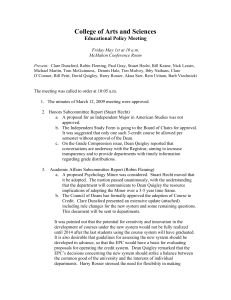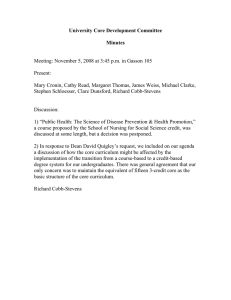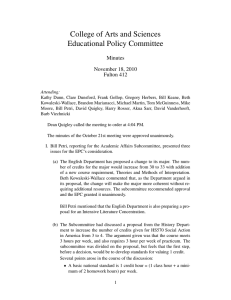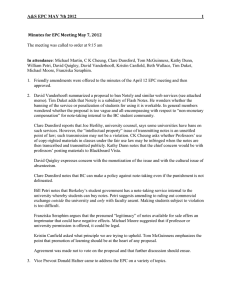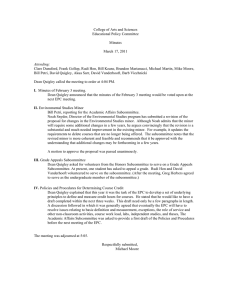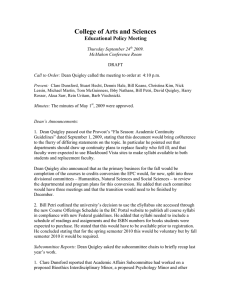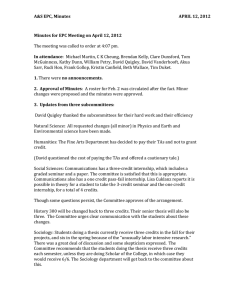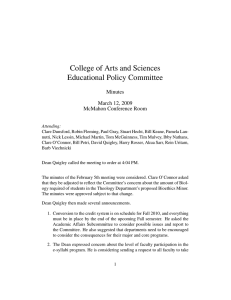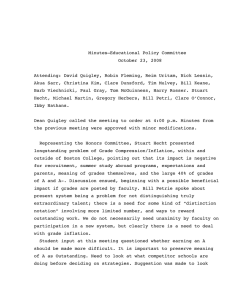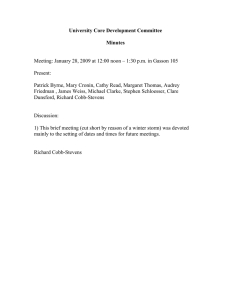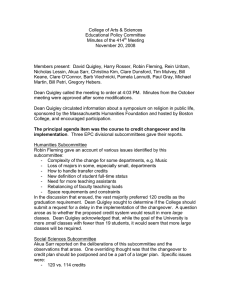College of Arts and Sciences Educational Policy Committee
advertisement
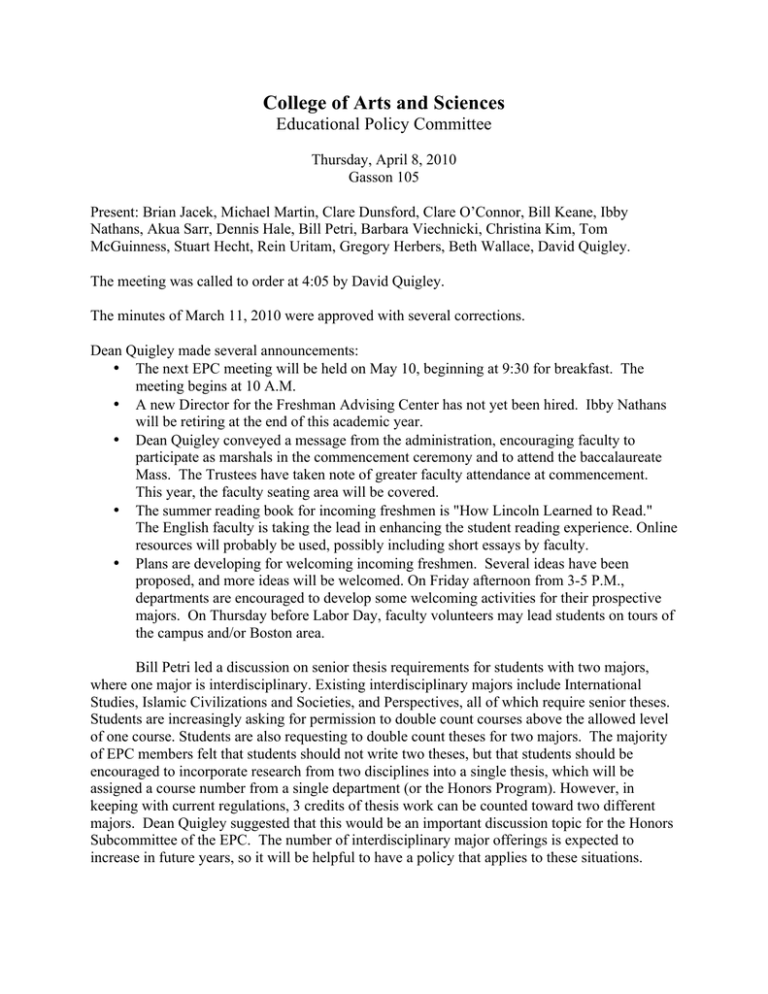
College of Arts and Sciences Educational Policy Committee Thursday, April 8, 2010 Gasson 105 Present: Brian Jacek, Michael Martin, Clare Dunsford, Clare O’Connor, Bill Keane, Ibby Nathans, Akua Sarr, Dennis Hale, Bill Petri, Barbara Viechnicki, Christina Kim, Tom McGuinness, Stuart Hecht, Rein Uritam, Gregory Herbers, Beth Wallace, David Quigley. The meeting was called to order at 4:05 by David Quigley. The minutes of March 11, 2010 were approved with several corrections. Dean Quigley made several announcements: • The next EPC meeting will be held on May 10, beginning at 9:30 for breakfast. The meeting begins at 10 A.M. • A new Director for the Freshman Advising Center has not yet been hired. Ibby Nathans will be retiring at the end of this academic year. • Dean Quigley conveyed a message from the administration, encouraging faculty to participate as marshals in the commencement ceremony and to attend the baccalaureate Mass. The Trustees have taken note of greater faculty attendance at commencement. This year, the faculty seating area will be covered. • The summer reading book for incoming freshmen is "How Lincoln Learned to Read." The English faculty is taking the lead in enhancing the student reading experience. Online resources will probably be used, possibly including short essays by faculty. • Plans are developing for welcoming incoming freshmen. Several ideas have been proposed, and more ideas will be welcomed. On Friday afternoon from 3-5 P.M., departments are encouraged to develop some welcoming activities for their prospective majors. On Thursday before Labor Day, faculty volunteers may lead students on tours of the campus and/or Boston area. Bill Petri led a discussion on senior thesis requirements for students with two majors, where one major is interdisciplinary. Existing interdisciplinary majors include International Studies, Islamic Civilizations and Societies, and Perspectives, all of which require senior theses. Students are increasingly asking for permission to double count courses above the allowed level of one course. Students are also requesting to double count theses for two majors. The majority of EPC members felt that students should not write two theses, but that students should be encouraged to incorporate research from two disciplines into a single thesis, which will be assigned a course number from a single department (or the Honors Program). However, in keeping with current regulations, 3 credits of thesis work can be counted toward two different majors. Dean Quigley suggested that this would be an important discussion topic for the Honors Subcommittee of the EPC. The number of interdisciplinary major offerings is expected to increase in future years, so it will be helpful to have a policy that applies to these situations. Clare Dunsford reported for the Academic Affairs Subcommittee regarding the requests from the Psychology and Mathematics Departments to offer Bachelor of Science degrees in addition to Bachelor of Arts degrees. Dean Dunsford summarized the responses from the Psychology Department to the remaining questions raised in meetings over the past several months. • The new B.S. degree in Psychology will replace the neuroscience concentration. • The B.S. will require laboratory experience, either as research projects conducted with one of the eight neuroscience faculty or in existing laboratory classes. • No new resources will be needed for the B.S. degree. The Academic Affairs subcommittee recommends approval of the Psychology B.S. degree. This recommendation was endorsed by the full EPC by acclamation. Dean Dunsford next summarized the responses from the Math Department in response to the subcommittee's questions. • The Committee inquired about the rationale for offering two Bachelors degrees in math. The Math Department is phasing out the existing M.S. degree, since they are beginning a Ph.D. program. Approximately 5-6 advanced B.A. students enroll in the existing M.S. courses each year, and many of these students will be interested in the new B.S. degree. The B.S. degree is expected to make students more marketable for graduate school and career. The existing B.A. is a successful program that also serves a need. Students enrolled in the B.A. program frequently have other majors/minors and may be going abroad. The new B.S. involves several 2-semester sequences, which will pose scheduling difficulties for these students. • The Committee was concerned about the lack of an explicit lab requirement and asked the Math Department to compare the new B.S. requirements with those at similar schools who already offer a B.S. in math. Brown, Duke and Georgetown were presented as examples. The B.S. degrees at these students do not have explicit lab requirements. The Department also felt that students were likely to get a lab experience in one of the corequisite courses for the B.S. • The subcommittee suggested that the Math Dept. submit a list of approved courses from other departments that will satisfy the requirement for science courses outside the Math Dept. This will be helpful to students and reduce demands on the undergraduate program director in the Math Dept. The Department has submitted a list of courses in physics, chemistry, biology, computer science and economics. Additional courses may be approved by the undergraduate program director. • Resource implications are minimal. The new program may require a few more graders, but no other needs are anticipated. The department is adding four new courses, while eliminating one section each of two existing courses in algebra and analysis. These courses will be replaced by four courses, comprising separate 2-semester sequences in algebra and analysis. • Bill Keane noted that the Department is discovering considerable student interest in the new degree option. Current juniors who wish to receive a B.S. will not be able to satisfy the new requirements, and some accommodation will be done on a case-by-case basis. The Academic Affairs subcommittee recommends approval of the Mathematics B.S. degree. This recommendation was endorsed by the full EPC by acclamation. Bill Petri reported that he has been working on course contract that will be used for independent study courses. The rationale for the contract is that individually arranged courses vary widely in their rigor and accountability. A&S faculty will be encouraged to have independent study students fill out contracts. The contracts should be ready for implementation in fall, 2010. Clare Dunsford noted some pressure resulting from transition to new credit system. While many A&S students will be taking additional coursework, it is likely that science majors will do less coursework. The meeting was adjourned at 4:50. Respectfully submitted, Clare O'Connor
